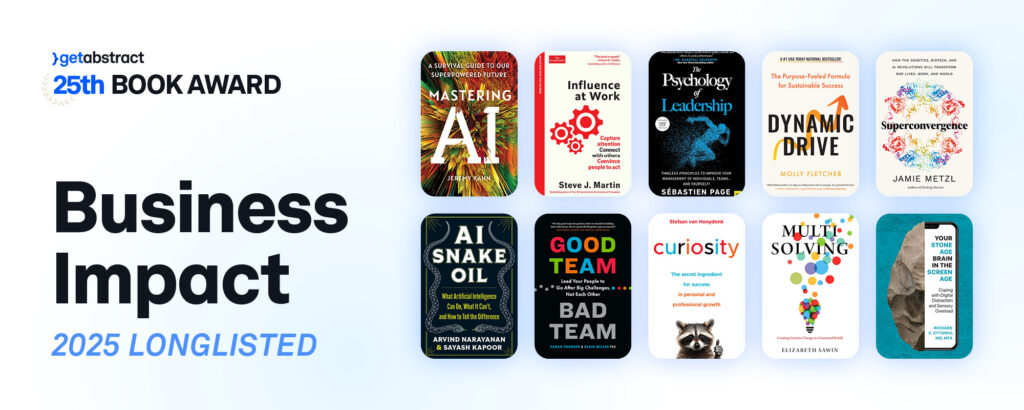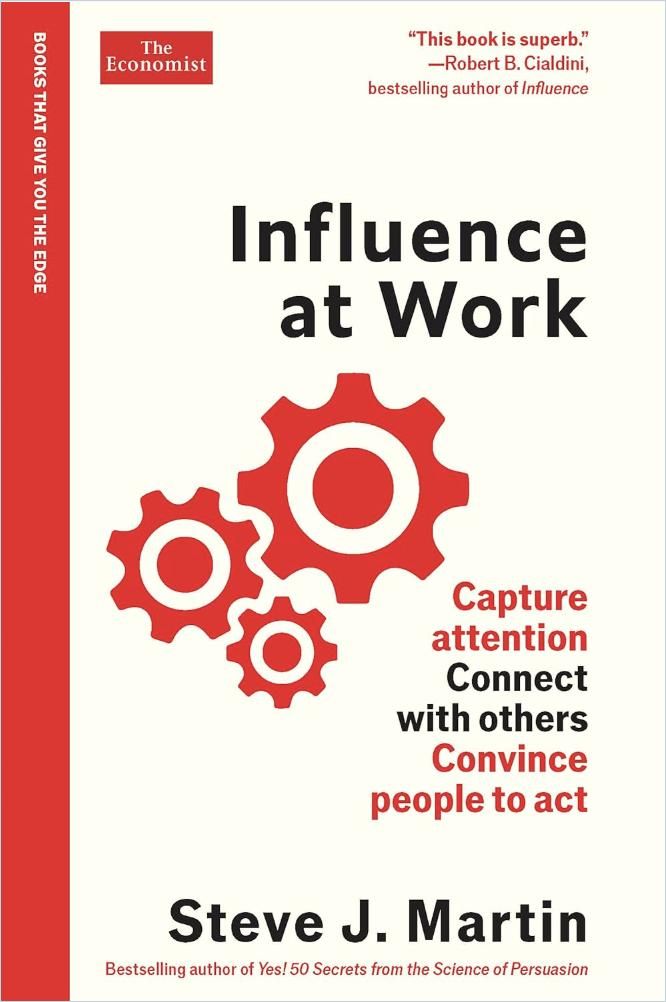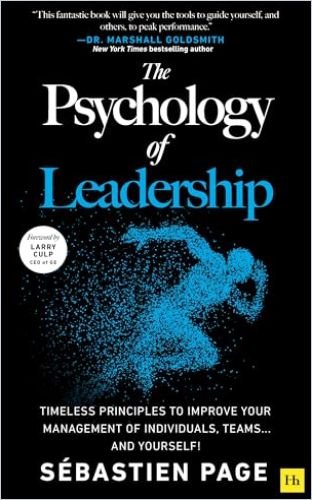Business Impact Award 2025: Here Is the Longlist!
Established in 2001, the getAbstract International Book Award is one of the longest continuously running non-fiction awards in the world. Aligned with our mission to provide actionable, business-relevant knowledge, the getAbstract International Book Award focuses on titles that help people make better decisions in their personal and professional lives – in line with our slogan ‘Know Better. Do Better.’
Here are this year’s nominees:

- Arvind Narayanan & Sayash Kapoor: AI Snake Oil
- Stefaan van Hooydonk: Curiosity
- Molly Fletcher: Dynamic Drive
- Sarah Thurber & Blair Miller: Good Team, Bad Team
- Steve J. Martin: Influence at Work
- Jeremy Kahn: Mastering AI
- Elizabeth Sawin: Multisolving
- Jamie Metzl: Superconvergence
- Sébastien Page: The Psychology of Leadership
- Richard E. Cytowic: Your Stone Age Brain in the Screen Age
Arvind Narayanan & Sayash Kapoor:
AI Snake Oil
Princeton UP, 2024
It’s time to differentiate between AI’s real capacities and the overhyped promises of Big Tech, say Princeton University computer science professor Arvind Narayanan and PhD candidate Sayash Kapoor.
This book takes an interesting approach to exposing the risks and limits of AI, cutting through industry hype with clarity and evidence. The innovative analogy to snake oil is spot-on, making this an eye-opening call for a mindset shift — not to accept AI thoughtlessly, but to question and critically challenge its claims.
Laura Lesum, Juror
Just as salesmen once sold snake oil as a “miracle cure” when, in reality, it had no medical benefits, people today are exaggerating AI’s potential. For instance, AI tools cannot give humanity perfect insight into future events — but they can lead to poor decision-making. Narayanan and Kapoor call on you to fight for the AI future you want, rather than accepting the future tech companies are trying to sell you.

Stefaan van Hooydonk:
Curiosity
Capstone, 2025
Though curiosity and innovation have a strong positive correlation, many workplaces discourage employee curiosity, viewing it as risky, disruptive, or a waste of time. However, as “recovering conformist” and founder of the Global Curiosity Institute Stefaan van Hooydonk argues, humanity can ill afford to shun inquisitiveness and innovation when faced with complex challenges, such as global warming.
This book puts a powerful spotlight on the role of curiosity in the workplace and its positive impact on learning, innovation, and adaptability. With an inspiring approach, it offers advice and routines. Curiosity may seem common, but it is often overlooked, and the author explains with clarity why a seeking mind is vital for both business and personal growth.
Daniel Baird, Juror
His insightful book explains how to break the barriers that hinder curiosity and presents several hacks to help you integrate curiosity into your team’s processes.

Molly Fletcher:
Dynamic Drive
Hachette Go, 2024
Are you ready to unlock your full potential and achieve lasting success? Sports agent Molly Fletcher reveals a powerful, purpose-driven approach to building motivation, sharpening focus, and confidently overcoming any challenge. By aligning your passions with your actions, Fletcher teaches you to find the drive to push past obstacles and thrive in even the toughest moments.
A thorough and inspiring read, especially for young professionals seeking to find their personal drive. Packed with lessons from the world of sports, it offers clear, practical guidance and memorable examples to build discipline, resilience, and purpose.
Laura Lesum, Juror
Through real-life stories and practical strategies, you’ll discover how to harness the power of resilience, connection, and purpose to elevate your performance. It’s time to embrace the dynamic energy that will propel you toward your biggest goals and beyond.

Sarah Thurber & Blair Miller:
Good Team, Bad Team
Page Two Publishers, 2024
Congratulations: You’re in charge of a high-profile team. Unfortunately, personnel problems hamper you and your team, so you seldom get the results you want. The main issue is a lack of unity. How can you solve this and other team-building problems?
This book provides highly practical and insightful advice for team leaders, grounded in understanding individual team members and how each person’s approach shapes team dynamics, performance, and outcomes.
Erica Rauzin, Juror
In this engaging, informative book, team-building experts Sarah Thurber and Blair Miller explain how to turn your bad team into a great one, basing much of their advice on the fascinating science of cognitive diversity. They also explain their “FourSight” problem-solving system, which has been used by Nike, NASA, and the United States Navy SEALs.

Steve J. Martin:
Influence at Work
The Economist Books, 2024
In this compelling guide, Steve J. Martin unpacks the science of influence, offering proven strategies to capture attention, forge authentic connections, and motivate others to take meaningful actions. Drawing on decades of research and real-world examples, Martin reveals how small changes in your approach can lead to big results in work and life.
Few topics are more important in the social media age than influence. This book approaches the topic from myriad angles, all familiar in an era with a volatile consumer economy and equally volatile politics. The book may help people exert influence – and also develop a sharper eye toward the tactics of influencers.
Daniel Baird, Juror
Whether you want to win over colleagues, inspire your team, or strengthen personal relationships, Martin provides practical tools to help you ethically and effectively influence others.

Jeremy Kahn:
Mastering AI
Simon & Schuster, 2024
What lies ahead when it comes to AI? Tech journalist Jeremy Kahn extols AI’s potential contributions to humanity but offers warnings as well. He highlights AI’s ability to transform science, the arts, industry, and medicine. At the same time, Kahn notes that AI might erode “human capabilities” and negatively affect job markets, trust, privacy, and democracy.
Mastering AI is a highly relevant read for decision-makers across sectors. It calls on individuals, companies, and governments to embrace AI as a powerful support tool – not a replacement. Jeremy Kahn advocates for a responsible, informed approach when it comes to AI that balances opportunity with risk.
Laura Lesum, Juror
Kahn describes the urgent need for ethical decision-making in automated systems development and regulations that govern AI output. Kahn further underscores that AI must complement, not replace, human talent.

Elizabeth Sawin:
Multisolving
Island Press, 2024
Complex problems abound, but multisolving – “using one investment of time, money, or energy to address multiple problems” – may hold the clue to penetrating them. With this strategy, complexity fosters solutions instead of thwarting them. Elizabeth Sawin, founder of the Multisolving Institute, offers systems thinking strategies for addressing multiple problems at once.
If you’ve wondered how to use systems thinking to solve problems, this helpful explanation provides both an overview and accessible methods — such as applying feedback to weigh a decision’s benefits and risks. Rich, well-chosen examples make the approach especially convincing.
Erica Rauzin, Juror
Some of her discussion is technical and even theoretical, but she supports it with good examples. Sawin shows how embracing multisolving can turn seemingly intractable challenges into opportunities. And she points out, just as you can use the same resources to address multiple problems, solving one problem can lead to solutions to other issues, as well.

Jamie Metzl:
Superconvergence
Hachette Book Group, 2024
As advances in biotechnology, genetics, and AI endow humanity with unprecedented powers, humans must embrace the responsibility, as well, to safeguard the good of people and the planet. Futurist and biotech expert Jamie Metzl offers a deep dive into the ways health care, industries, and private life could look radically different in the future, and the threats new technologies could pose.
AI has a staggering impact on various industries and professional fields, and leaders must be aware of how these impacts are accumulating and combining. This overview may seem more theoretical than directly applicable, but its message signals pressing, practical challenges that are certain to emerge.
Erica Rauzin, Juror
Metzl balances hope with a healthy concern for the potential risks of new powers becoming increasingly democratized and decentralized, and calls on readers to work together to build a future that promotes the good of all.

Sébastien Page:
The Psychology of Leadership
Harriman House, 2025
T. Rowe Price executive Sébastien Page combines his business acumen with sports psychology, positive psychology, and personality psychology to develop insights into leadership and spur innovative thinking. He finds that leadership goes beyond winning – in sports and in business – and demands the mental skills to enable and then promote high-end performance. These skills include staying aware of unintended consequences, organizing your work around your goals, and not obsessing over winning.
Sébastien Page wrote an innovative, yet highly practical book that combines various psychological models with a focus on the mental skills required for sustained high performance. With its refreshing message that winning isn’t the ultimate goal, neither in sports nor in business, it challenges conventional leadership thinking and reframes leadership through a more sustainable and human-centered lens.
Laura Lesum, Juror
With grounding in academic research, Page’s book offers practical suggestions on orienting your thinking as a leader and as a human being.

Richard E. Cytowic:
Your Stone Age Brain in the Screen Age
MIT Press, 2024
If you’re like many people, you probably struggle to keep your screen time in check. Neurologist Richard E. Cytowic explains why your brain is evolutionarily hardwired to seek your phone every time you see a blinking alert, why doing so may be harming you, or your children, and what you can start doing to develop a healthier relationship with digital technology.
We grasp that too much screen time is harmful, but this gives us a scientifically grounded understanding of why that is so and how to fight back with strategies rooted in cognitive science.
Erica Rauzin, Juror
Gain insights into the ways heavy screen time use is changing children’s brains, and what humanity stands to lose if people don’t start reclaiming their attention and engaging more with their off-screen world.

The winners of the Business Impact Award will be announced at the award ceremony in Frankfurt am Main on 15 October 2025. Click here for the German selection. Here, you can find the nominees for the Learning Impact Award.



